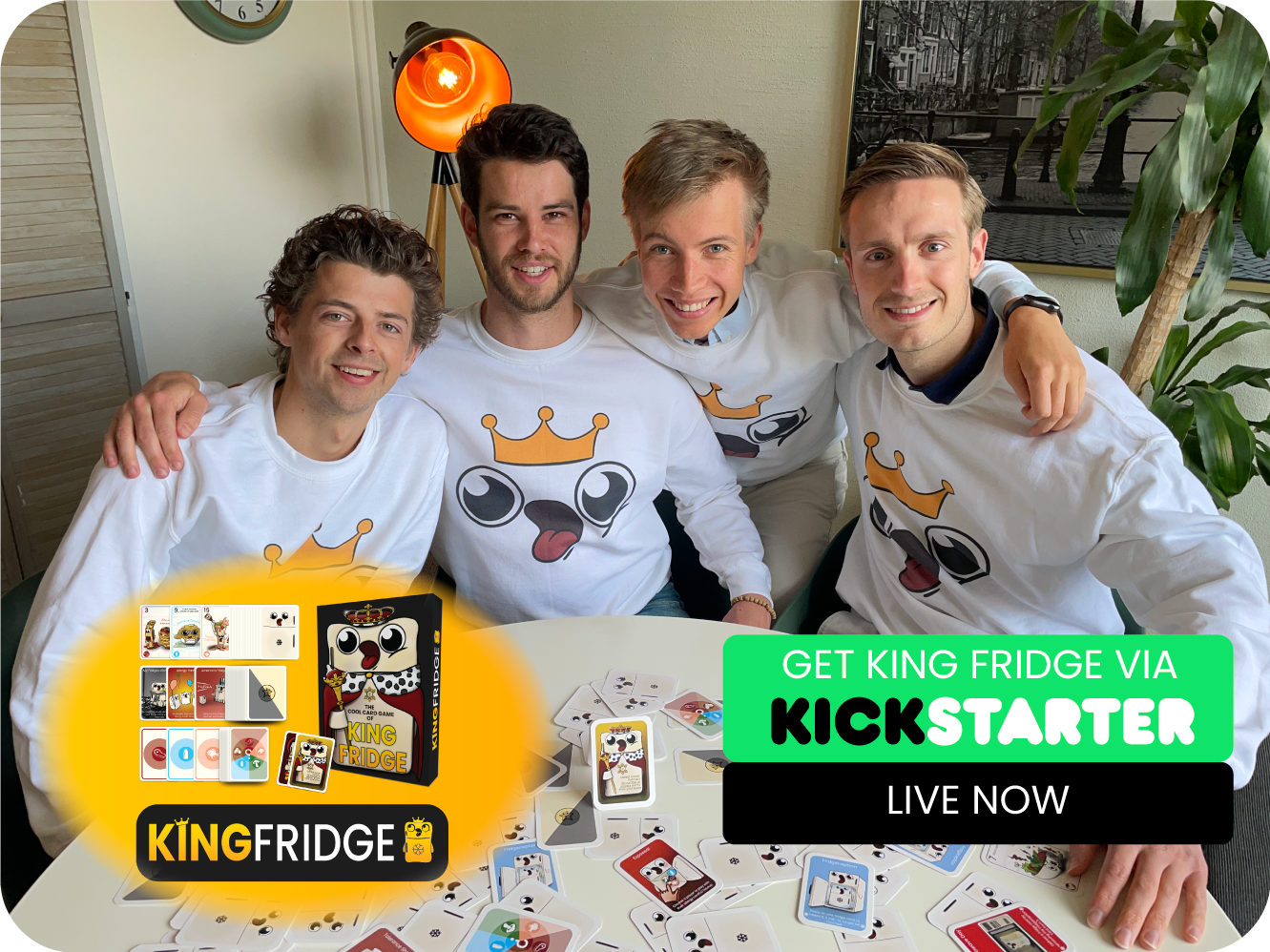PhD student Sjoerd Loenen made the most of the lockdown. Together with three friends he brought his childhood dream to life: he developed a card game.
PhD student Sjoerd Loenen (second from left) and his friends invested their savings in producing prototypes to further test the game. (Photo: GoatLab Games)
It all started in 2015, when Sjoerd Loenen (now a PhD student at QuTech) visited Hong Kong for a summer school. During his stay he met fellow students Koen Pijnappels, Dennis Beemsterboer and Niels Janssen. The four hit it off right away and it turned out that they shared a joint passion for hiking, exploring cultures and card games.
Hiking trips
Since then, the friends have gone on several hiking trips. They visited Retezat, a nature park in Romania and they climbed mountains in Spain. “During our trips we would always play card games and sometimes even talked about creating our own,” Loenen recalls.
But it wasn’t until their most recent trip to the Swiss Alps that this thought became more serious. Loenen explains how it started. “Dennis had moved to Basel in 2019, so when the European borders briefly opened right after the first lockdown, we decided to head out there to explore the mountains.”
One evening when the four were sitting in a remote cabin with their feet up and a beer in hand, they started playing a game whose rules they invented on the spot. “The game was so much fun that we played it night after night. We kept improving the rules and on the last night we decided that everyone should get to know this game!”
Committed
And so the friends embarked on the challenging adventure of creating a card game. “The process required a lot of imagination, as this was the first game we had ever developed. But it also allowed hidden talents to surface. Koen turned out to be quite skilled at drawing, Niels built a website in no time, Dennis discovered a passion for video and design, and I taught myself the fine art of creative software packages and fulfilment logistics.”
After two months of tweaking the game mechanism and their initial designs, they invested their savings in producing prototypes to further test the game. “That was the best thing we could have done,” says Loenen. “With each iteration we used a different group of play-testers to gather feedback. Slowly but surely, the game came to life and converged in our strategic game called King Fridge.”
King Fridge is all about collecting the tastiest fridges and sabotaging friends by making sure they end up with the nastiest ones. But there are some twists like allergy cards. See how it works in the explainer video:
Crowdfunding
Now, almost six years after they met, their first real card game is ready to be shared with the world. So that they would not have to market the game with too large an investment, they set up a crowdfunding campaign through Kickstarter. Loenen explains that “Crowdfunding allows buyers to express their interest before the product is actually produced, and allows us to tap into the demand of the market without making big investments.”
But on the very first day of their Kickstarter campaign, there was so much demand that they reached their initial goal of EUR 1,500 within 42 minutes. “Up to now we have raised more than EUR 6,500 with over 280 people buying one or more games. Because of the success in the first few days, the game will now definitely be produced.” He expects that the first investors will get their copy of King Fridge somewhere in December as the extremely crowded game production market means that it will take up to 24 weeks to produce the game.
Patient 0
“And this is just the beginning,” says Loenen. In the future he hopes the game will also be available in physical shops and on platforms such as Bol.com and Amazon.
“We want to create a kind of a snowball effect via Kickstarter.” Using Covid-19 as an analogy, he hopes to reach as many ‘patient 0s’, – but then in the positive sense of the word – as possible, who will play the game with others. “Since we know that the game is so much fun, we are sure the reproduction rate (‘R’) will be far above one.”
- Visit the Kickstarter website for more information about King Fridge or investment opportunities.
Do you have a question or comment about this article?
m.vanderveldt@tudelft.nl


Comments are closed.